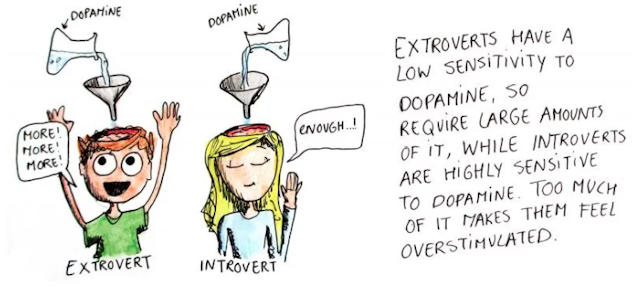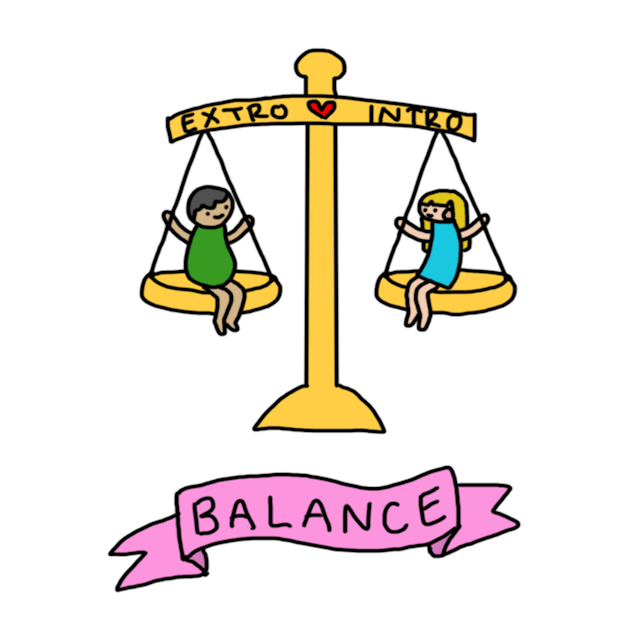What *is* an introvert?
I'm going to answer this question with a little help from the experts on 'the world of introverts', and ones I've been following for a while now.
First, a confession: at first, I had come across the word 'introvert' before, but didn't really think that I was one. Well, I wasn't exactly sure.
Teenage-me was probably a more obvious introvert. But then I started working in recruitment, and 'sales-me' wasn't the most outwardly-obvious introvert.

Mate, you're definitely *not* an introvert. These were the words spoken to me, with a raised eyebrow, by a former colleague who actually ended up being my manager.
So, why did this guy - and admittedly, also me - initially think that I wasn't an introvert?
Because we both had an incorrect understanding of what an introvert was, that’s why.
When it came to being with people and in environments that I was comfortable with, I was a slow-burner when it came to talking but then could be very sociable indeed (still the case).
Even during those awkward teen years, I was the class-clown in some classes.
Like many introverts, Susan Cain’s 2012 TED Talk and Quiet book resonated with me hard when I first came across them.
This was in my early 20s. A lot suddenly started to make sense. I wasn’t weird, I was an introvert. OMG, there's nothing wrong with me. I'm an introvert. And there's millions of others out there, just like me! *yay*
I wanted to tell anyone and everyone about my introversion.
More than 7 years on since Susan Cain took to that TED stage in February 2012, there has been something of an introvert uprising - and especially so on the web, where us innies like to hang out.
There are blogs, discussions, and even scientific research papers all on introversion. This make me so happy. BUT, as wonderful as this is, there still continues to be some confusion and misunderstanding around introversion.
For example, let's go back to those words my former colleague shot in my direction. He wasn't the only one. I was frequently told that there was no way I could be an introvert, as I apparently “loved to talk”. Again, this was more in my days of recruitment when I developed a somewhat chattier self to survive the job I was doing.
But still - Grr. Talking and being an introvert are not mutually exclusive, people!
This post will aim to clear up some of this confusion, and we'll address the big What is an introvert? question with a little help from the experts.
So, let's dive right in.
It's all about where we get our energy from
Michaela Chung over at IntrovertSpring articulates it well:
“The most basic definition of an introvert is a person who gains energy from being alone and loses energy in stimulating environments, such as social events.”
Or in other words, we have a preference for periods of alone-time, and requires this down-time to recharge our batteries.
Susan Cain helps to paint a more colourful picture:
"Introverts, in contrast, may have strong social skills and enjoy parties and business meetings, but after a while wish they were home in their pajamas. They prefer to devote their social energies to close friends, colleagues, and family. They listen more than they talk, think before they speak, and often feel as if they express themselves better in writing than in conversation.
They tend to dislike conflict. Many have a horror of small talk, but enjoy deep discussions.”
It feels like Susan has know me for a long, long time!
Ah, I love pyjamas (we spell that word slightly differently here in the UK). Warm, cosy evenings in. Or out with a friend or a small group of friends (2-4 is ideal).
Maybe watching a film or reading a book. I think the Danes call that “hygge”.
Anyway, I digress…
So, introversion & extroversion are all about energy, you see.
Beth Buelow, of The Introvert Entrepreneur, even argues that these traits are more energetic traits, rather than personality:
"Introversion and extroversion are two traits among many that inform how we show up in the world. I prefer to think of them as energetic traits, rather than personality traits. They certainly influence our personality, but at their core, they are about where we gain and drain energy.
Introverts gain energy from solitude and low-stimulation environments, and drain energy during social interaction or high-stimulation environments. Extroverts gain energy from social interaction and drain energy when left for too long on their own without people."
Beth goes on to explain how all of us, introverts and introverts, need both social interaction and solitude:
"To be clear, introverts need people, and extroverts need solitude; it’s a matter of which one you prefer and gain the most energy from when you need it. Time in solitude is what gives an introvert energy to be social. Extroverts build up their energy reserves around people, and that sustains them during quieter periods."
Introversion vs shyness
Okay, now listen up, because this one is *important*. Beth also explains how introversion and shyness are not the same thing at all. Repeat: introversion is not shyness(!).
Over to Beth:
“One’s introversion or extroversion doesn’t define one’s social life, it only influences it. Introversion is not shyness. Shyness is social anxiety, and introversion is about energy gain and drain. The two might overlap in the same person, but they are not, by definition, the same thing. These terms were coined in 1921 by Swiss psychiatrist Carl Gustav Jung.”
Ahhhh, so all this introvert stuff is starting to become clearer now… kinda fascinating, isn’t it? It gets even more interesting, though…
Introvert brains
So this is where it's gets really fascinating. It blew my mind when I first read about this.
Introverts’ brains are wired differently. Yeah, seriously. Over to Jenn Granneman at Introvert, Dear:
“Introverts tend to feel drained after socializing and regain their energy by spending time alone. This is largely because introverts’ brains respond to dopamine differently than extroverts’ brains. In other words, if you’re an introvert, you were likely born that way.”

Fa-sci-nating stuff, eh.
Studies by psychologist Hans Eysenck show that introverts require less stimulation from the world in order to be awake and alert than extroverts do - i.e. introverts are more easily over-stimulated. Read more about Ensyenck's studies, and similar ones, over here.
Speaking of psychologists…
Marti Olsen Laney, (of MartiLaney.com) a Doctor of Psychology and also a qualified Marriage & Family Therapist, also talks about the science:
“Introverts have a longer neural pathway for processing stimuli. Information runs through a pathway that is associated with long-term memory and planning. In other words, it’s more complicated for introverts to process interactions and events. As they process information, introverts are carefully attending to their internal thoughts and feelings at the same time.”
-> If you wanna geek out on more science, you might enjoy this Quiet Rev article. Also, Introvert, Dear has a dedicated section all about introvert science! You can find it right here.
Okay, so you’re still with me aren’t you? Now I have to warn you, this is where it gets a little less clear-cut.
What about the whole 'ambivert' thing?
You see, arguably, no one is a total introvert nor a total extrovert, rather somewhere on an introvert-extrovert spectrum (continuum). So technically we are all ambiverts, to some extent.
BUT, most of us favour one more than the other, even if we might be towards the middle of the spectrum.
Michaela Chung: “No one is entirely an introvert or entirely an extrovert. Each person falls on a different point in the spectrum. A person who lands in the middle of the spectrum is called an ambivert.”
And extroverts?
So, we have learnt all about introverts. Because we don’t want the extroverts feeling too left out (we like them, really… ).
We've talked about the typical traits of introverts, it's only fair to do the same with extroverts. So, here's a little summary.
An extrovert will typically resonate with all or most of the following statements:
Likes to communicate by talking
Tends to act first before thinking
Enjoys group work
Feels isolated by too much time spent alone
Looks to others and outside sources for ideas and inspiration
Likes to talk about thoughts and feelings
In summary
So, to wrap it all up, what's the main difference between introverts and extroverts?
Again, eloquently summed-up by our innie friend Michaela @ IntrovertSpring:
“While introverts gain energy from being alone, extroverts need lots of human interaction and outward stimulation to recharge. Extroverts tend to think as they speak, allowing them to have fast-paced conversations that flit from topic to topic. (Conversely, introverts prefer slower paced conversations that allow them to think before they speak).”

So, there you have it. Phew. That was a lot to take in. I’m definitely an introvert, if there was even a smidgen of doubt. Can you imagine how awkward that could’ve been…
A final, personal note from me
I’m no introvert expert, but I wanted to finish on a more personal note.
For me, it has been both enlightening and empowering to discover my being an introvert, and knowing that there was nothing inherently wrong with me and millions of others out there just like me. Pretty much every statement I have read about introversion, I can relate to in one way or another.
But, it's important to note that introversion & extroversion isn't black and white. It's not as simple and clear-cut as that.
For example now and then, I enjoy going to a crowded rave. (Again, managing my energy pre-, during- and after- said rave is critical).
And I know extroverts who also don’t particularly enjoy small-talk, for example. Who does?!
The point I’m trying to make here, is that us human beings are so wonderfully unique and complex and inter-changeable that nothing is absolute. The extent of our introversion (or extroversion) can vary depending on our environment and state of mind. It also fluctuates throughout our life. Any “test” should be taken with a pinch of salt.
That said, the introvert/extrovert and MBTI tests are the 2 tests I have come across that I can most relate to, and have found both most useful and most accurate, vs the many other personality tests/groupings I have come across out there.
Psst. Before you go.
Here’s something else you’ll love…
QuietRev’s 6 Illustrations That Show What It’s Like in an Introvert’s Head
With great thanks to the wisdom of:
Michaela Chung @ Introvert Spring
Susan Cain @ QuietRev
Beth Buelow @ The Introvert Entrepreneur
Jenn Granneman @ Introvert, Dear
Marti Olsen Laney @ Hidden Gifts of the Introverted Child
Jas
PS. Thanks so much for reading :) And, if you're new here, hey & welcome 👋🏼
👉🏼 start here | read articles | subscribe